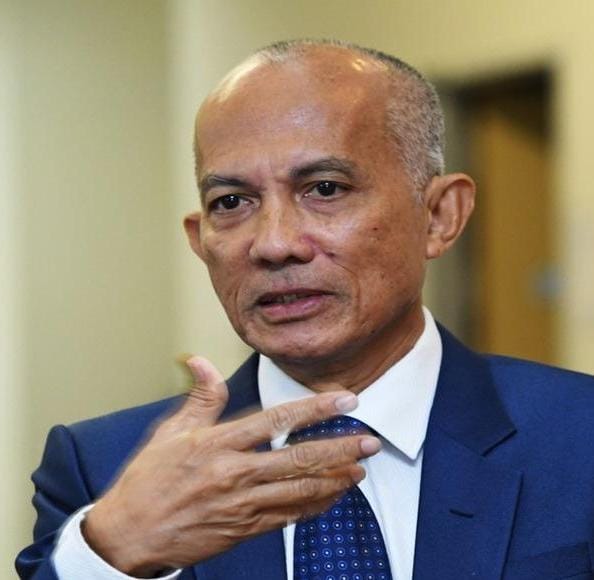Still got that fire. Datuk Seri Azman Ujang chats with TNS News about his journey from cadet reporter to journalism icon. “Once a journalist, always a journalist,” he says.
By TENGKU NOOR SHAMSIAH TENGKU ABDULLAH
KUALA LUMPUR: In Malaysian journalism, few figures command the quiet authority and enduring respect that Datuk Seri Azman Ujang does. Over nearly four decades, he didn’t just witness the transformation of the country’s media landscape — he helped shape it. And in doing so, made history.
In an exclusive interview with TNS News, Azman reflects on a career defined not by ambition alone, but by an unshakable dedication to journalism. From the dusty newsrooms of Sarawak to the summit of Malaysian media, he is the only individual ever to hold all three top positions at BERNAMA: Editor-in-Chief, Chief Executive Officer, and Chairman.
Azman’s passion for news was ignited early. Growing up in Bintulu in the 1960s, he became a regular reader of The Straits Times and The Sarawak Tribune, a by-product of the English-medium education system in Sarawak at the time.
“It was through newspaper reading that I developed a keen interest in keeping updated with news, both local and foreign. I was fascinated by how it was written,” he recalls.
In 1971, fresh out of school, he was selected from dozens of applicants as one of only two cadet reporters hired for BERNAMA’s Kuching bureau. It was a dream come true but it came with no formal training.
“It was challenging. I was given assignments from day one. But I had already trained myself through reading.”
He didn’t just want to report stories. He wanted to shape them.
“I had a secret aim to be different. To make an impact.”
Azman quickly developed a signature style: clean, punchy intros and bold story angles. He never rushed the lead.
“One passion I had was that the intro of my story must have some ooomph. I don’t go for plain or run-of-the-mill intros.”
In BERNAMA, where bylines were reserved for exclusive or exceptional stories, Azman’s name appeared more than any other journalist in the agency’s history.
“Getting a byline is like a badge of honour. That, and my work ethic, probably helped me rise through the ranks.”
His early mentors included his first bureau chief, S.N. Rajan, and S.C. Chan of The Sarawak Tribune, who inspired Azman’s belief in writing with impact.
“There’s no place in journalism for slipshod work,” he says firmly.
From cadet reporter, he rose steadily becoming Editor-in-Chief in 2004 and CEO in 2007. He eventually retired in 2008, only to return in 2016 as Chairman, completing a historic trifecta that no one else has matched.
“To hold all three posts was something I never imagined.”
Despite his titles, Azman never let hierarchy define him.
“Even as CEO, I insisted people just call me AU. No honorifics. The position didn’t change me. I was still very much a reporter at heart.”
He led with humility, rarely taking sick leave, working beyond the call of duty, and never lobbying for promotion.
“Let your dedication, quality, and integrity be the best judge of who you are.”
Azman has received numerous accolades, including awards from the Malaysian Press Institute, the National Union of Journalists, and journalism bodies in his home state of Sarawak.
But one stands out above all:
“The award closest to my heart is from the Japanese government — the Order of the Rising Sun, Gold Rays with Neck Ribbon. It recognised my role in promoting mutual understanding between Japan and Malaysia through my writing. That meant a lot.”
Even in retirement, Azman hasn’t let go of the pen. He continues to write Off the Cuff, a weekly column in The Sun, where he tackles the issues that matter most from Malaysia’s shocking motorcycle death toll to water pricing.
“Far too many of our young citizens die from motorcycle-related crashes. I call it road genocide. I’ve prescribed solutions but there’s no political will to act.”
“And we take clean water far too much for granted. We need a more realistic water tariff to ensure long-term sustainability.”
Azman is not shy in his critique of the modern newsroom.
“Journalism today is not as vigorous as during my time. There’s too much reliance on tech like AI and ChatGPT. We had to slog and crack our mental prowess.”
He’s particularly frustrated by the erosion of follow-up questioning.
“Reporters now often leave stories hanging. When the PM recently said new housing projects must include schools no one asked who’s going to pay for it. That’s the reporter’s job to fill in the blanks.”
During his time, Azman was known for bold questions that made headlines not for show, but for substance.
“I wasn’t afraid to ask provocative questions. And when the answers became front-page headlines, that gave me a deep sense of satisfaction.”
Azman welcomes the long-awaited formation of the Malaysian Media Council, but he issues a word of caution.
“My hope is that it avoids playing a ‘big brother’ role. I know it won’t but just a caution.”
He encourages the Council to emulate Indonesia’s Majlis Pers, where even the President respects its authority.
“That’s how it should be empowering, not policing.”
Legacy of a Journalist’s Journalist
What does he want to leave behind?
“Don’t stop writing just because you think you’re too busy,” he says, offering praise for those who’ve managed to keep the journalist’s flame alive despite climbing the ranks.
He points to Datuk Seri Wong Chun Wai, current Chairman of BERNAMA and former long-time editor at The Star, as a shining example.
“He never stopped writing even as he moved up to senior positions in The Star. And now, as Chairman of BERNAMA, he’s more prolific than ever. He’s everywhere with the country’s top leaders, opinion makers, movers and shakers.”
Azman adds that Wong’s continued passion and consistency earned him the country’s highest honour in journalism.
“He recently received the Tokoh Wartawan Negara award. That says it all. The fire never dimmed.”
It’s this same fire that Azman hopes younger journalists will preserve that sense of duty to the truth, and pride in the craft.
“Once a journalist, always a journalist.”
Azman’s legacy is not only in the leadership roles he held, but in the standards he upheld. He worked through pain, put stories above ego, and let his work speak louder than titles.
In an age where the media rushes to keep up with algorithms and breaking alerts, Datuk Seri Azman Ujang offers a masterclass in what journalism can and must still aspire to be: principled, persistent, and purpose-driven.
He didn’t just serve BERNAMA.
He shaped its soul.
He didn’t just report the headlines.
He wrote the standards by which others are now measured.
His career is not simply a collection of stories, but a story in itself, one written in ink, carried by integrity, and bound by a lifelong belief in the power of truth told well. If legacy in journalism can be captured in one name, it is his.
— TNS NEWS


